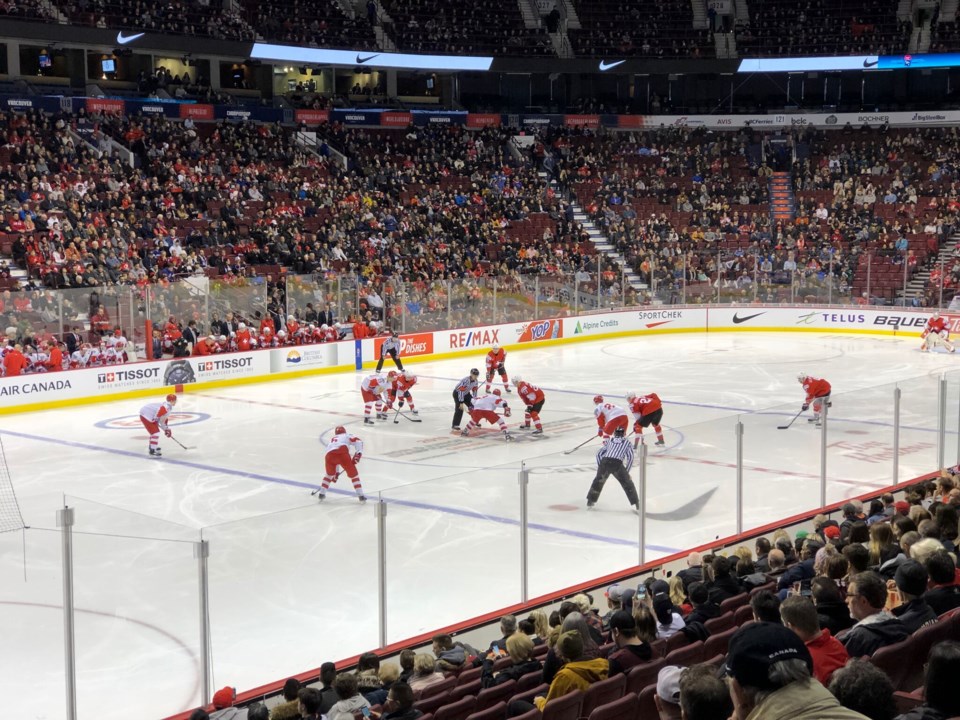Average ice times and power play percentages are giving way to an entirely different set of metrics now that the Finns have marched out of town with gold medals in tow.
Two days after the conclusion of the World Junior Hockey Championships, the Courier reached out to Hockey Canada, the city and tournament organizers to get a glimpse of numbers not found on stat sheets: attendance, economic impacts and ticket sales.
Hockey Canada spokesperson Dean McIntosh said preliminary estimates suggest between $35 and $45 million was kicked up in Vancouver bars, hotels, restaurants and in the rink itself over the course of the 11-day tournament.
The numbers in Victoria sit between $10 and $15 million, and those totals cover the timeframe from the day the tournament was awarded to the two cities on Dec. 1, 2016 up until the conclusion of Saturday night’s final.
The 2006 competition in Vancouver, Kelowna and Kamloops drummed up about $80 million.
This year’s tournament, however, was far more spread out. Pre-tournament games and training camps were held across Vancouver Island, Metro Vancouver and in Kamloops and Kelowna. Hockey Canada’s financial target was in the neighbourhood of $50 million worth of economic spinoffs for the entirety of B.C.
“Right now, based on what we know, that would be a very reasonable estimate based on past economic impact as well as current assessment on attendance and tickets,” McIntosh told the Courier Tuesday.
About 304,000 bums were in seats in both cities, representing a per-game average attendance of 12,640 in Vancouver and 6,078 in the provincial capital.
The 2006 tournament boasted local attendance in the neighbourhood of 325,000, while last year’s competition in Buffalo struggled to move past the 200,000 mark.
Part of the paltry attendance at last year’s event was a lack of uptick in ticket packages that got fans into virtually any game they wanted. That didn’t happen this year, as just shy of 12,000 full tournament packages were sold in Vancouver and 4,000 more in Victoria. Average upper bowl prices ranged between $30 and $50.
Playing half the tournament in a non-NHL arena helped keep rental costs down, McIntosh said.
Even after Canada’s flukey 2-1 loss to the Finns in the quarterfinals, the final four games had an average attendance of about 14,500.
“I’ve spoken with the hotels, they didn’t see a drop off once Canada was knocked out — their rooms were already pre-booked and Hockey Canada had already pre-sold all the tickets,” said Michelle Collens, the city’s manager of sport hosting.
Collens said the period running November to February is the city’s leanest from a tourism perspective. She was at Rogers Arena and in the downtown core each day of the tournament and saw packed bars and restaurants.
“For this time of year on a Thursday night, or whatever day it was, places were jamming people in and we were so excited to see the business,” Collens said.
Organizing committee co-chair Ron Toigo was admittedly “hockey-ed out” when reached by the Courier on Monday. The Vancouver Giants’ majority owner was also still bummed about the home team’s quarterfinal loss, which marked the first time Canada didn’t medal when the tourney was on home soil.
But for all the things within Toigo’s control, he was pretty pleased.
“This was an extremely successful tournament — I’d say it was one of the best from a measuring stick of player experience, fan experience, the dollars and cents, volume of people,” Toigo said. “Whatever format you want to use for measurement, I think we’re going to check off all of them.”
@JohnKurucz



